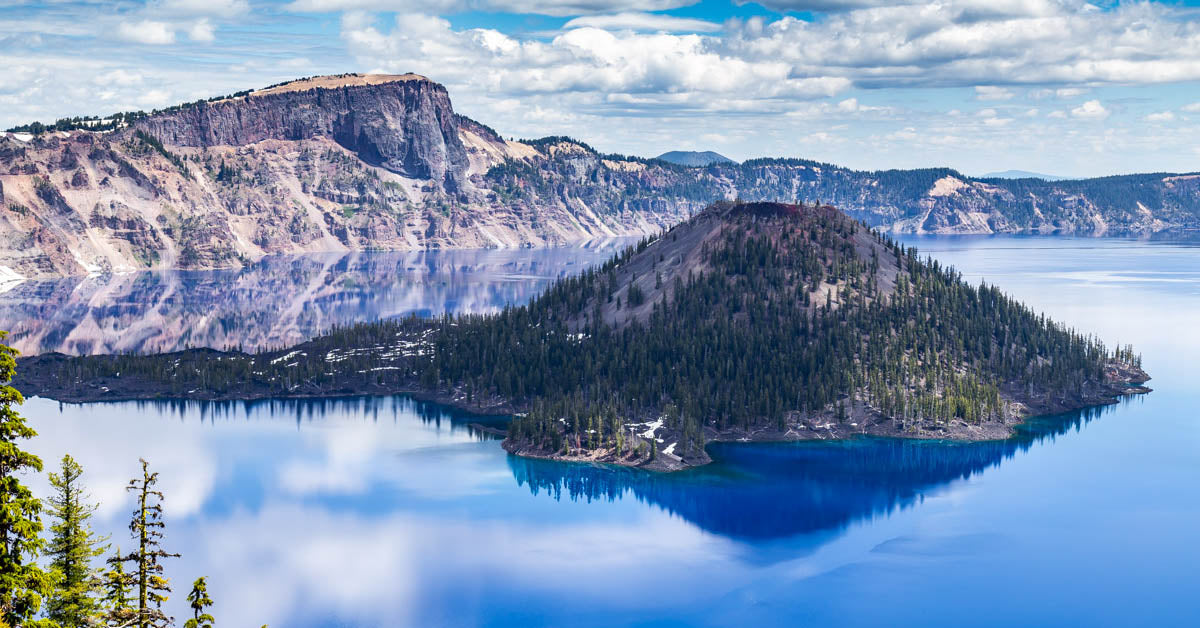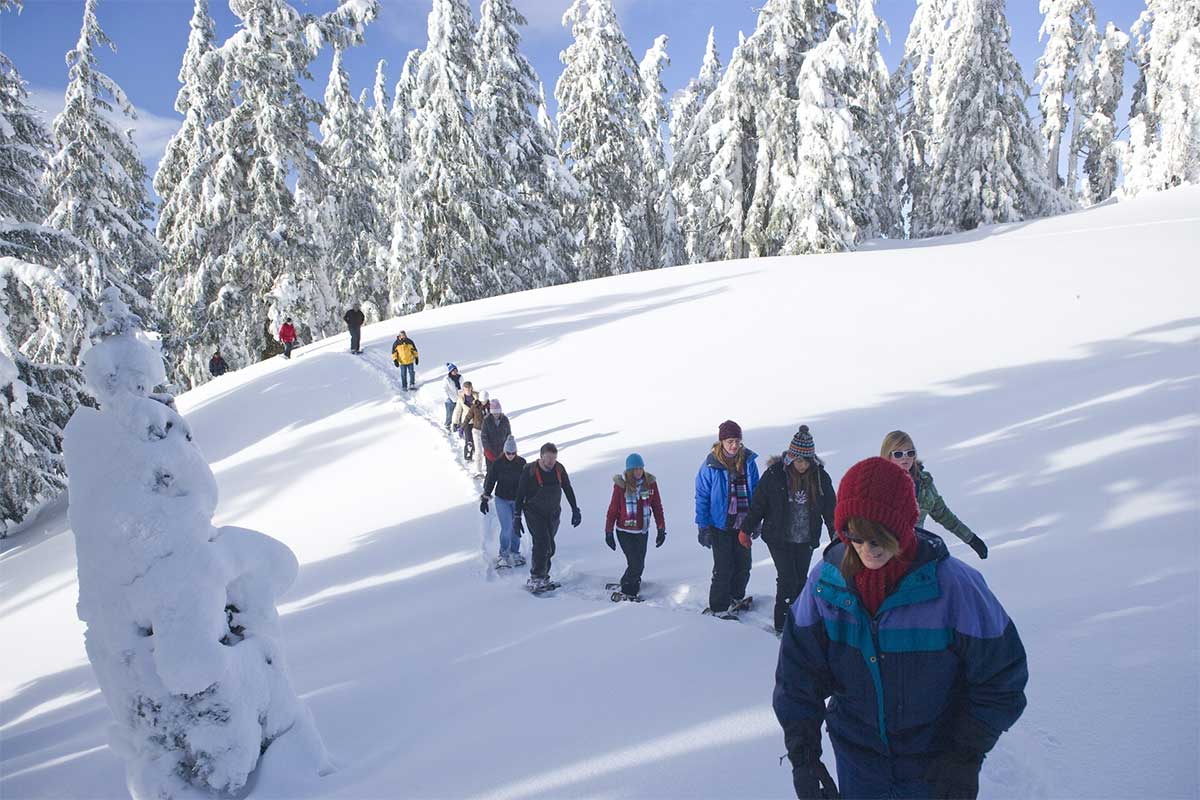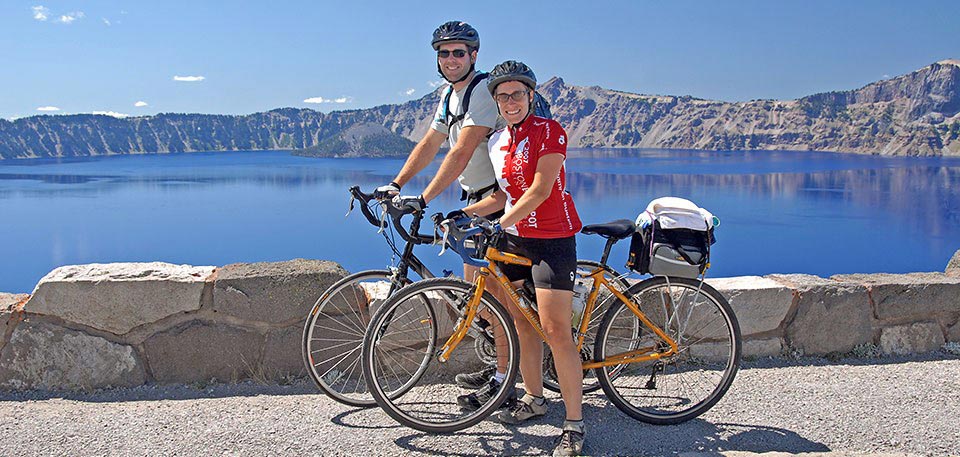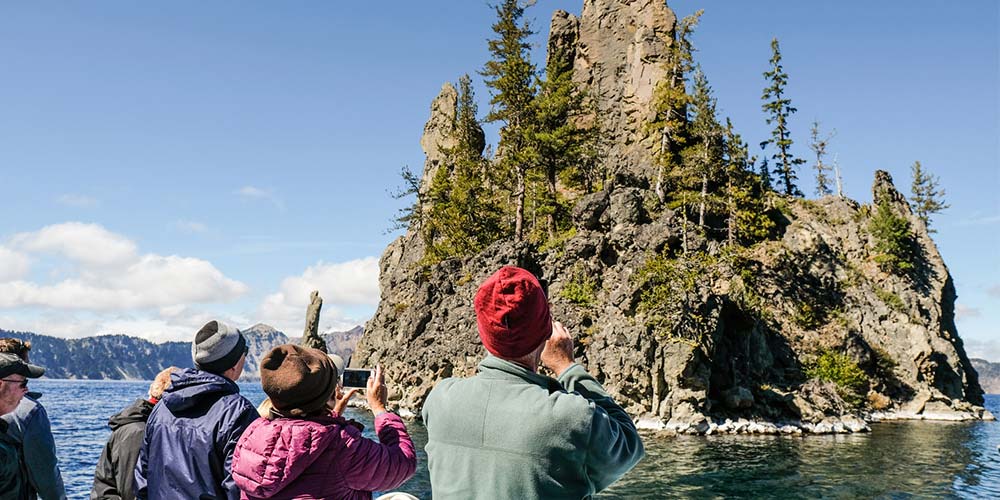Crater Lake inspires awe. Fed by rain and snow, it's the deepest lake in the United States and one of the most pristine on earth. Artists, photographers, and sightseers gaze in wonder at its blue water and stunning setting atop the Cascade Mountain Range.

Crater Lake is also one of the snowiest inhabited places in the US. Each winter, deep snow forces the closure of the park's Rim Drive and North Entrance to cars -- and Rim Drive becomes a trail for skiing and snowshoeing; the North Entrance road becomes a snowmobile trail. These roads close for the season with the first big October snowstorm, or on November 1, whichever comes first. Plowing closed roads typically begins in mid-April. But it takes a long time to open them up and there are no set dates. The North Entrance and West Rim Drive can open as early as mid-May or as late as the end of June. The East Rim Drive fully opens sometime between mid-June and late July.
My name is Rob Decker and I'm a photographer and graphic artist with a single great passion for America's National Parks! Crater Lake is an amazing place and well worth the visit. If you're a winter sports enthusiast, then go early. Otherwise, I'd recommend that you go during the warmer summer months when all of the activities will be available to you during your stay -- sometimes roads, trails and campgrounds are closed due to snow. So if this is your first time to the park, or your returning after many years, here are some things you should know about Crater Lake National Park!
Winter Activities
The park receives an average of 43 feet of snow each year, making the winter months challenging. However, if you're prepared, the parks winter trails and unplowed roads provide skiers and snowshoers with access to open slopes, dense forests, and breathtaking views, making Crater Lake ideal for both day-trippers and backcountry visitors.
Ranger Led Snowshoe Walks

Ranger-guided snowshoe walks become increasingly popular each year. The walks generally last two hours, and cover 1 to 2 miles of moderate-to-strenuous terrain. The ranger determines the route but most walks begin at Rim Village and continue through the sub-alpine forests and meadows along the lake rim. The park provides snowshoes at no cost or you are welcome to use your own. Previous snowshoeing experience is not necessary but coming prepared with warm clothing and water-resistant footwear is required. All participants must be at least 8 years of age. Space on each tour is limited, and advance reservations are required. As winter approaches, call the park's visitor center at 541-594-3100 for information on how to sign up. The visitor center is open daily from 10:00 am to 4:00 pm except on December 25. Organized groups may be able to arrange for a separate tour, if staff is available.
Sledding
Many opportunities for sledding can be found throughout the park but there are no designated sled hills or snow play areas. Select a location with a gentle slope that is free of trees and other obstacles. The slope should end with a flat landing for safe and easy stopping. One popular spot is the open meadow south of Crater Lake Lodge. For your safety, sledding, tubing, and tobogganing are prohibited in the caldera and on all roadways within the park where vehicle traffic may occur and in all parking lots.
Downhill Skiing and Snowboarding
Snowboarding and downhill skiing are allowed in the park but are absolutely prohibited in the caldera. The park does not have any chairlifts. All downhill skiers and snowboarders must hike up to a destination before riding down a slope. Be familiar with the up and down routes, and potential dangers. Know how to self-rescue. Assisted rescues in avalanche areas, and from places hard to reach may take more than 24 hours. Avalanche terrain exists in the park but there is no formal avalanche forecasting. If you choose to be in avalanche areas carry probes, snow shovels, and avalanche transceivers. Taking an avalanche course is recommended.
Bicycling

Each year, increasing numbers of cyclists come to Crater Lake National Park to ride around the lake on the physically demanding, 33 mile Rim Drive. Steep hills at high elevation may encourage even the most fit riders to pause at many of the road's thirty overlooks and pull-outs. The payoff however is spectacular scenery, viewed at a pace that few visitors choose to take enough time for.
Rules and Safety
Riders face many hazards including high speeds on steep downhill sections, rocks, animals, potholes and other road hazards as well as heavy traffic volume. Only cyclists experienced at riding with auto traffic should consider road biking at Crater Lake. Park roads seldom have shoulders and no bike lanes exist. Bicycles are not permitted on park trails. Water is available only at Rim Village, Park Headquarters, and Mazama Village.
Mountain Biking
Crater Lake has one dirt road where mountain biking is allowed. The Grayback Drive provides eight miles of unpaved and vehicle free roadway. Those seeking the thrill of single track trails will have to look outside the park. Crater Lake does not offer any single track mountain biking trails.
Winter Fat Tire Biking
The activity of fat tire biking is growing in popularity in many winter recreation areas. But current park regulation prohibit the use and operation of fat tire bikes on winter trails within the park.
Crater Lake Boat Tours

The best way to see Crater Lake is by boat! For visitors seeking to explore Wizard Island, we offer either a boat cruise or a quick shuttle ride straight to the island. There is a 2.2-mile round-trip trail (down to the boat dock and back) that drops approximately 700 ft. Due to the strenuous nature of this trail, we do not recommend these tours to anyone with medical or physical issues. The hike down to the dock takes approximately 30-45 minutes.
Camping

Lost Creek Campground is a small, tents-only campground located on the road to Pinnacles Overlook, three miles from the rim of Crater Lake. It usually opens in early July and closes in mid-October. In July and August, the campground typically fills by mid-afternoon. Each site has a picnic table and bear-resistant food locker. Mazama Campground is located 7 miles south of Rim Village near Highway 62 in a forested setting. The campground is open only during the summer. Each site has a picnic table, fire ring, and bear-resistant food locker..
Backcountry Camping
Crater Lake National Park has over 90 miles of hiking trails that are accessible in the summer months, providing visitors a great way to discover the park. Come prepared to hike at elevations in changing weather patterns. Park elevations range from around 4,500 feet to almost 9,000 feet above sea level, and depending on the time of year, weather conditions can go from sunny and clear to heavy snow in just a few hours. If you're new to backcountry camping and travel, seek the proper training and advice of an experienced friend or park ranger. Always tell a friend your plans and remember safety is your responsibility.
Backcountry Camping Permits
A backcountry camping permit is required year-round for all overnight trips in the backcountry. The free permit is only valid for the dates, locations, and party size specified. Permits are not required for day hiking; however, day hikers must observe all backcountry regulations. All backcountry camping permits are issued free of charge and must be obtained in person, during business hours. You must have a valid park entrance pass for the entire length of your trip. For more information about backcountry camping permits, contact the backcountry office by phone at (541) 594-3060.
Ranger-Led Activities & Exhibits
The Sinnott Memorial Overlook, perched on a rock ledge behind the Rim Visitor Center, features an indoor exhibit room and an open parapet with spectacular lake views. The overlook has a relief model and exhibits on the park's geology and lake research. The overlook is open daily (weather permitting) from late June through October. Hours are 9:30 am to 6:30 pm in July and August, 9:30 am to 5:00 pm in June and September, and 10:00 am to 4:00 pm in October. Unfortunately, the overlook is not accessible to people with limited mobility; it is located down a steep, historic walkway with stairs. Ranger talks are presented daily from late June to late September.
Click here to see the Crater Lake National Park poster.
Rob Decker is a photographer and graphic artist who had the rare privilege of studying under Ansel Adams in Yosemite National Park when he was just 19 years old. Now, Rob is on a journey to explore and photograph all 61 of America's National Parks. He's creating WPA-style posters to help people celebrate their own national park adventures — as well as encourage others to get out and explore!
Source: https://national-park-posters.com/blogs/national-park-posters/best-things-to-do-at-crater-lake-national-park
